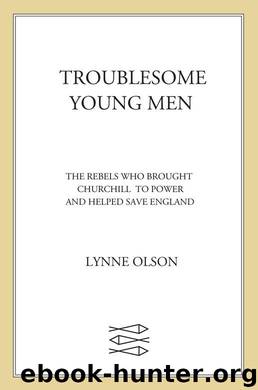Troublesome Young Men: The Rebels Who Brought Churchill to Power and Helped Save England by Olson Lynne

Author:Olson, Lynne [Olson, Lynne]
Language: eng
Format: epub
Publisher: Farrar, Straus and Giroux
Published: 2008-04-29T00:00:00+00:00
For the men of the British Expeditionary Force, which had been dispatched to France on September 10, it was also turning out to be a phantom conflict. The two BEF corps, made up of four regular infantry divisions, were dug in on the French-Belgian border, north of the Maginot Line and more than 100 miles from the nearest German troops. British commanders had no plans for any sort of offensive against Germany. Neither did the French, who counted on the Maginot Line, a 280-mile-long fortified zone of underground forts, barbed wire, pillboxes, and tank traps, to keep the enemy at bay.
“What kind of war, what kind of game is this?” the CBS correspondent William L. Shirer demanded in a broadcast from a peaceful Germany. There were various answers to Shirer’s question: to British troops, it was the “bore war”; to the French, the drôle de guerre; in the United States, the “phony war.” Everywhere one looked on the so-called western front, there were scenes of bucolic peace, with cattle grazing in the fields and French farmhands bringing in the harvest. In the view of Maj. Gen. Roger Evans, who commanded Britain’s First Armoured Division, it was a disgraceful way to conduct a war, “an ignoble contrast to the great battle on the eastern front, where the last desperate resistance of Poland was beaten down by the mighty torrent of German arms.”
For Generals Alan Brooke and John Dill, the two British corps commanders, the lack of action was a godsend, since in their opinion British troops were totally unfit for combat. The British Army, which had held no major maneuvers since 1930, was, in the words of one observer, “a mere parade-ground army.” In addition to their insufficient training, the troops were faced with a desperate shortage of almost everything they needed: trucks, field artillery, radios, heavy gun tractors, antiaircraft guns and ammunition, antitank guns, mortars, machine guns and their carriers, and, above all, tanks. While the Germans were slicing through Poland with their tanks and mechanized infantry, the British had no effective medium or heavy tanks and wouldn’t have them in any great numbers until 1941. As Maj. Gen. Bernard Law Montgomery noted, the scarcity of modern tanks was particularly infuriating since the tank was a British invention and had been used against the Germans in the Great War.
Early in October, General Brooke, who was given command of the entire British Army later in the war, wrote in his diary that he and Dill were “in the depths of gloom” over the lack of arms, equipment, and training. Britain, Brooke added, is “facing this war in a halfhearted way.” He concluded that the government had sent the BEF to France not to fight but as a public relations gesture, to show that some action, however minimal, was being taken. “The most depressing part of the business is the apparent failure on the part of GHQ to realize how serious these difficulties are!”
Montgomery, who took over command of the army’s Third
Download
This site does not store any files on its server. We only index and link to content provided by other sites. Please contact the content providers to delete copyright contents if any and email us, we'll remove relevant links or contents immediately.
| Africa | Americas |
| Arctic & Antarctica | Asia |
| Australia & Oceania | Europe |
| Middle East | Russia |
| United States | World |
| Ancient Civilizations | Military |
| Historical Study & Educational Resources |
Elizabeth by Philippa Jones(1862)
Mary Boleyn by Alison Weir(1465)
Traitors of the Tower by Alison Weir(1359)
A Journal of the Plague Year (Oxford World's Classics) by Daniel Defoe(1228)
Eleanor of Aquitaine by Marion Meade(1084)
Moon Tiger by Penelope Lively(1070)
A Short History of England by Simon Jenkins(1066)
The Real Middle Earth by Brian Bates(1049)
Life of Pi by Yann Martel(1031)
London Under by Peter Ackroyd(1017)
Notes From a Small Island by Bill Bryson(1010)
Queen Isabella by Alison Weir(1005)
American Idol by Richard Rushfield(924)
Her Majesty's Spymaster by Stephen Budiansky(909)
Tudors Versus Stewarts by Linda Porter(905)
Albion by Peter Ackroyd(838)
Cromwell, Our Chief Of Men by Fraser Antonia(814)
The Creation of Anne Boleyn by Susan Bordo(813)
Children Of England: The Heirs of King Henry VIII 1547-1558 by Weir Alison(812)
